COPENHAGEN, Denmark – If you’ve followed the automotive industry for long enough, you likely remember when SUVs made by companies known for low-slung sports cars were the subject of controversial headlines. Fast-forward to 2023, and the controversial has become commonplace. Massive people-movers with supercar-like power are the status quo in the luxury segment, they usually outsell their more poster-friendly stablemates by a wide margin, and many of the companies who aren’t already on this bandwagon are looking for a place to jump on.
Unveiled in 2017, the Lamborghini Urus has amassed a significant following (it’s the Italian brand’s best-seller) and a growing list of rivals that includes the Aston Martin DBX. While it’s no longer the newest kid on the block, it recently received a round of updates and gained a range-topping Performante variant.
“We got a lot of new customers with the Urus,” said Luca Pacini, Lamborghini’s head of R&D strategy and projects coordination. “We’re happy that people recognize the Lamborghini brand in it, and we decided to characterize it even more by offering a wider range that stretches from comfort to performance — performance is Lamborghini’s DNA, after all. This caters to the demands of our customers.”

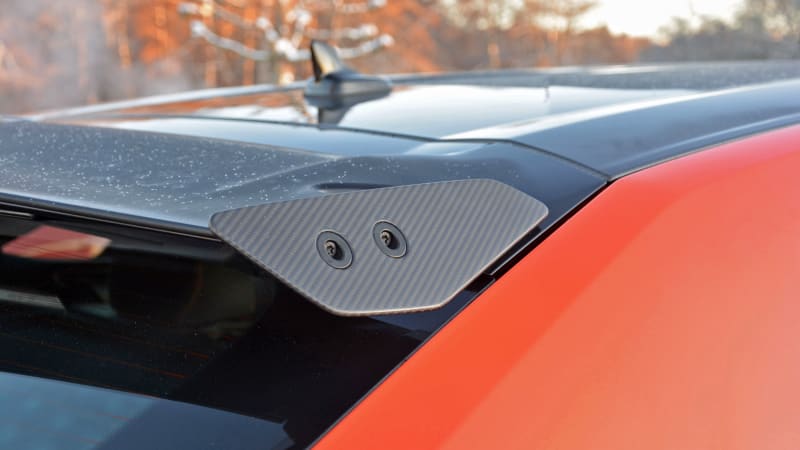
Releasing a sportier Urus makes perfect sense since sister company Bentley and rival Aston Martin both offer higher-spec variants of their SUVs. Still, calling it “Performante” is a bold move because Lamborghini has historically reserved this nameplate for hardcore evolutions of its V10-powered models. It’s not merely a marketing pirouette: the Pikes Peak record-setting Urus Performante stands out from the Urus S with a specific body kit that includes a redesigned front splitter and a reasonably subtle roof-mounted spoiler. Lamborghini claims these updates contribute to a not-insignificant 8% increase in downforce.
Carbon fiber parts (like the vented hood) and a titanium exhaust system designed by Akrapovič help make the Performante about 104 pounds lighter than the Urus S, though it nonetheless tips the scale at approximately 4,740 pounds. Light? Well … yes, kind of. Although the uber-Urus weighs about twice as much as a new Mazda MX-5 Miata, none of the models it competes against qualify for the “lightweight” label. Aston’s DBX 707 checks in at 4,940 pounds and every Bentayga variant weighs more than 5,000.
Chassis changes are part of the Performante treatment as well. Lamborghini replaced the adaptive, height-adjustable air struts it puts in the Urus S with simpler steel springs, though it retained the electromechanical active roll stabilization system and retuned it. These updates give the Performante a lower ride height (20 mm), and Lamborghini also widened the front and rear tracks (16 mm) to clear space for huge tires.
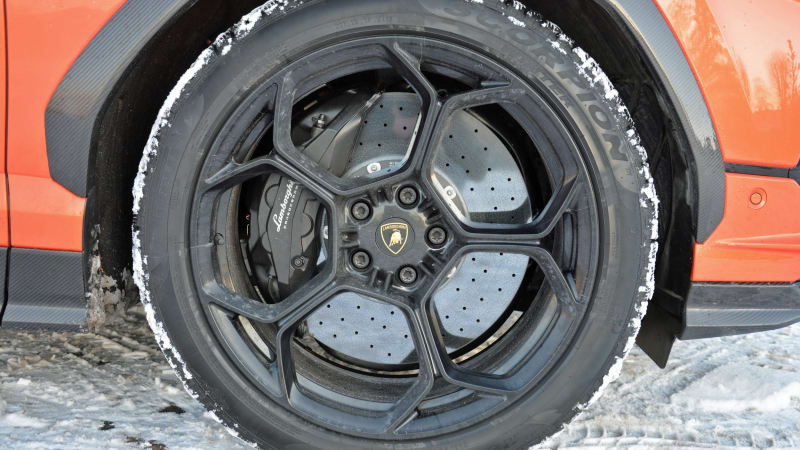
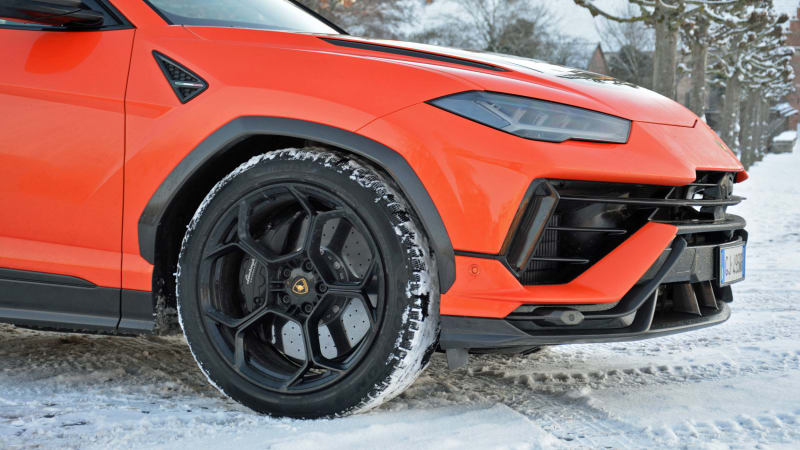
What the Performante doesn’t get is extra power. It ships with the same 4.0-liter twin-turbocharged V8 found in the Urus S. The eight-cylinder develops 657 horsepower at 6,000 rpm and 627 pound-feet of torque from 2,300 to 4,500 rpm, and it channels this output to the four wheels via an eight-speed automatic transmission and a Torsen center differential. Lamborghini quotes a zero-to-62-mph time of 3.3 seconds (down from 3.5 for the S) and a top speed of 190 mph (a few tenths more than the S).
More power can be difficult to argue against, but Lamborghini’s rationale is that the Performante doesn’t need to take all-you-can-eat turns at the horsepower counter. Its mission is to deliver the best-possible handling rather than the best-possible acceleration or the highest-possible top speed. This is the Urus you want to take on a trip across the Rockies, not one you want to take to the nearest drag strip.
Not that I would be driving in the Rockies. The highest point in Denmark stands at 561 feet above sea level, which amounts to a rounding error in Colorado, so I didn’t exactly have the opportunity to wring out the Performante on mountain roads, but driving it back-to-back with the Urus S highlighted the changes that set these two bulls apart.
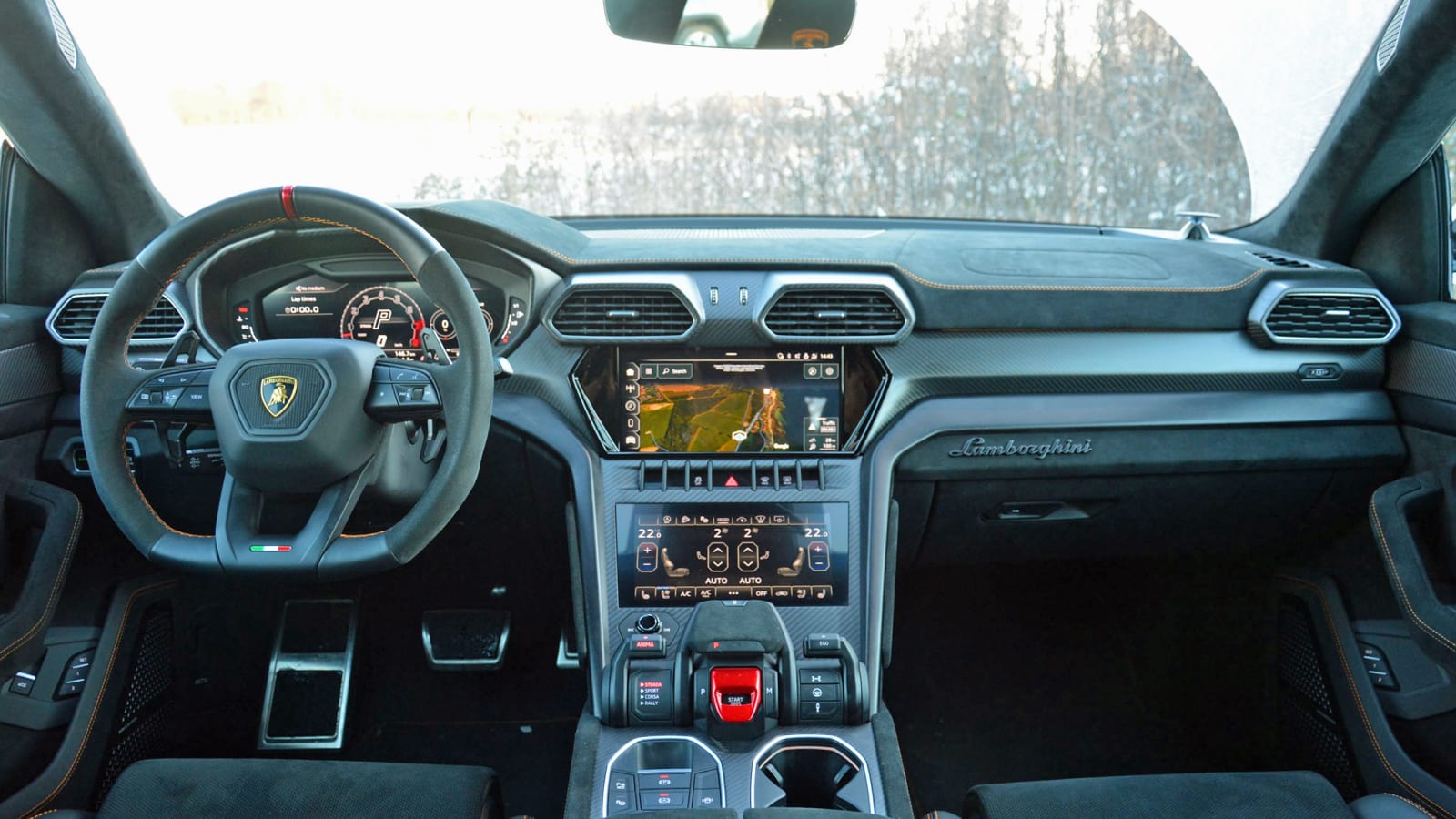
Inside, both variants of the Urus look and feel like driver’s cars. Neither share any significant parts with the Huracán but the cabin’s basic layout is similar: sitting on a nicely-bolstered sport seat, the driver faces a meaty three-spoke steering wheel with a 12-o’clock mark, shift paddles, and a digital instrument cluster. Fit and finish are excellent, which you’d rightfully expect in a car with a house-like price tag.
My tester featured Alcantara upholstery, orange stitching that matches the paint, and yards of carbon fiber. If that’s not your cup of tea, there are thousands of ways to configure either Urus variant.
Lift the red, fighter jet-inspired flap to push the ignition button (or, if your pinky is skinny enough, try to push the button through the hole in the flap) and the difference between the S and the Performante is audible. The titanium exhaust system saves weight and also helps bring more of the engine’s symphony into the cabin, especially when “Sport” mode is selected. It’s not overkill, we’re not talking about a 25-year-old econobox with a four-inch exhaust, and it doesn’t drone once you get moving. It sounds good, and it’s an instant reminder of why many enthusiasts are fascinated by engines and the oily bits in them.
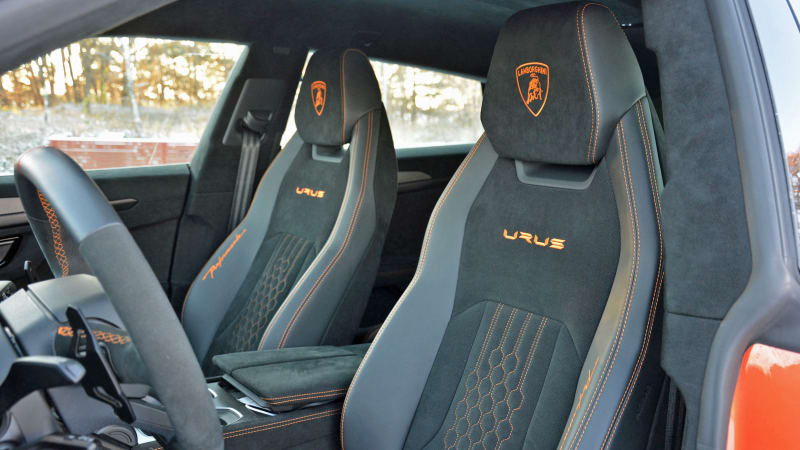
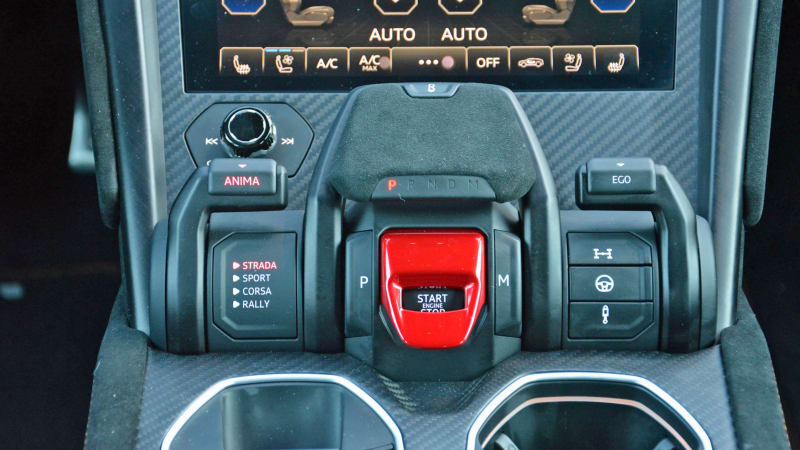
Around town, the S and the Performante aren’t tremendously different. It’s when traffic clears and the pace picks up that the latter feels noticeably more hardcore than the former. While it’s not a stripped-out track car, the throttle response is crisper and the steering feels better connected to the wheels. The suspension changes make a massive difference, too: although the Performante’s steel springs deliver a ride that’s moderately harsher than the air setup in the S, they also unlock sharper and more predictable handling. You don’t need to go flat-out on an Italian race track to tell the difference between the two.
The brakes are the same: 10-piston front calipers that grip 17.3-inch carbon-ceramic rotors (that’s over 2 inches bigger than the Miura’s wheels!) and single-piston rear calipers mounted over 14.5-inch rotors. This hardware is more than up to the task of confidently slowing down a 4,700-pound brute.
Not injecting extra power into the drivetrain isn’t necessarily a bad thing. Would, say, 40 extra horses hurt? Hell no, the idea of a 700-horsepower Lamborghini SUV is delightful, but the twin-turbo V8 is smooth and plenty responsive as-is thanks in part to the wide torque band. Peak torque is never far away, and the transmission delivers quick shifts regardless of whether you use the paddles or let it do its own thing. Besides, numbers don’t tell the whole story: the two Urus variants look similar when compared on paper but on the road, the Performante clearly sticks out as the enthusiast’s choice — it’s more driver-focused, and it behaves like the big-boned, family-friendly five-seater sports car that it is.
Trying out the Performante-specific Rally mode on Denmark’s network of public roads sounded unwise; it essentially allows the driver to kick the rear end out into a drift on loose surfaces. I bet it’s a hoot, but I know the cost of a parking ticket in Denmark (here’s a hint: it ain’t cheap) and I do not wish to discover the cost of a reckless driving conviction. But, the snow and ice that I encountered in the more rural parts of the country allowed me to put grip to the test. In spite of all the carbon fiber bits, the hunkered-down suspension, and the roaring exhaust, the Urus drives very much like a normal, all-wheel-drive SUV on frozen roads, especially when it’s riding on a top-notch set of snow tires. I used common sense and didn’t worry about road conditions; I trusted that the various electronic driving aids would do their thing to keep the pointy front end pointed in the right direction, and they didn’t frighten or fail me.
Pricing is another one of the major differences between the two Urus flavors. Lamborghini charges about $230,000 for the S and around $261,000 for the Performante — in theory, you can buy the Urus S and a new Subaru BRZ and have a few grand left for a set of autocross tires. Whether this premium is worth it depends on where and how you drive. If you need a commuter, odds are you won’t benefit from the spicy mix of a fixed steel suspension and extra aerodynamic bits. If you need a commuter and a canyon-storming weekender, even if said canyon isn’t paved, the Performante ticks both boxes in a way that very nearly makes it feel (and sound!) like an overgrown hot hatch with supercar-like power.
Related video:
